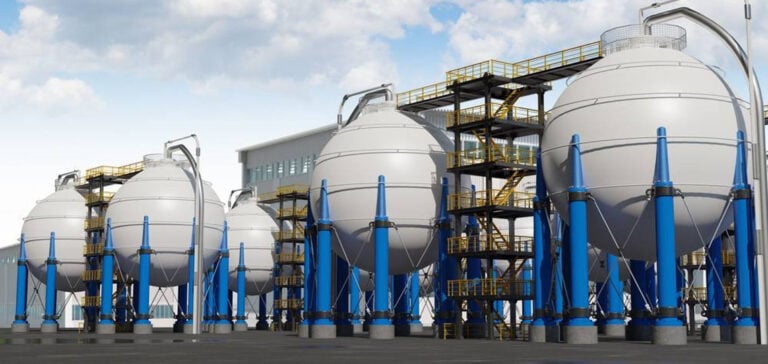North Rhine-Westphalia has announced 4.7 million euros in funding to support RWE’s Bedburg electrolyser project, a crucial step towardsgreen hydrogen production.
Bedburg electrolysis plant
The project involves the construction of an electrolysis plant with a capacity of around 5 megawatts (MW) to produce green hydrogen.
Silke Krebs, State Secretary at the Ministry of Economics, Industry, Climate Action and Energy of North Rhine-Westphalia, handed over the funding commitment to Sopna Sury, COO Hydrogen at RWE. Sopna Sury estimated the total investment cost for the plant at around 25 million euros.
The benefits of Green Hydrogen for local businesses
Sopna Sury, COO Hydrogen at RWE Generation, said: “RWE’s green hydrogen can help local companies convert their fossil fuel processes to locally produced green hydrogen to meet their climate targets. The funding commitment from North Rhine-Westphalia is an important first step towards implementing the full project in Bedburg, which will also include a filling station to distribute green hydrogen by road in the absence of grid structures.”
Impact on Regional Energy Transformation
Silke Krebs, State Secretary at the North Rhine-Westphalian Ministry of Economics, Industry, Climate Action and Energy, commented: “The development of the hydrogen economy is of immense importance for the energy and industrial state of North Rhine-Westphalia, and in particular for the Rhenish Revier. Projects like H2 Bedburg can make an important contribution to kick-starting North Rhine-Westphalia’s energy transformation into Europe’s first climate-neutral industrial region, guaranteeing security of energy supply and enabling the region’s sustainable development. Investing in hydrogen secures the region’s economic future and jobs! I’m therefore delighted that our financing now enables us to give the green light to the installation of the electrolysis plant.”
View of the Mayor of Bedburg
Sascha Solbach, Mayor of Bedburg, added: “With this financial commitment, we are opening a new chapter in the development of our energy identity here in Bedburg. By using locally produced renewable energy from our wind farms in the region, we are offering businesses in the town and region the opportunity to make their operations and production CO2-neutral and therefore sustainable for the future. The same applies to mobility and transport. These are impulses for the entire Rhenish mining region – made in Bedburg!”
Location of the Electrolysis Plant
The smelter will be built in the Mühlenerft industrial park, a site approved by the Bedburg authorities for industrial development. The city authorities are ready to make the required area available for the project.
Conditions for the Distribution of Green Hydrogen
A key condition for the implementation of the hydrogen project is the conclusion of economically viable long-term purchasing agreements with customers in the surrounding region. In addition, potential areas of application for green hydrogen include logistics companies close to the Mühlenerft industrial park, and vehicles in the local public transport network, which are to be converted to run on green hydrogen. For an initial period, Bedburg should not be connected to the central hydrogen network planned by the German government. This means that the green hydrogen produced by the planned electrolyser can only be distributed by tanker.
Preparing the Hydrogen Filling and Service Station
RWE is therefore also preparing to build a tanker filling station and a hydrogen filling station in Bedburg. This part of the project will require successful participation in German government tenders for the expansion of hydrogen filling stations. Assuming the filling station is built and approved quickly, the whole plant could start supplying hydrogen to the region in 2026.
RWE: A Complete Player in the Green Hydrogen Sector
When it comes to hydrogen, RWE has all the possibilities under one roof: from green electricity generation to expertise in green hydrogen production and storage, via its Supply & Trading business which can make the fuel available to meet the needs of industrial customers. RWE is currently working with top-level partners on over 30 hydrogen projects.






















